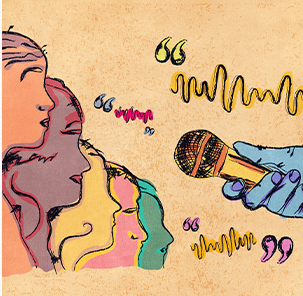Subscribe and receive the best Inkyfada podcasts straight to your mailbox.
Don't miss out! Subscribe to our newsletter to receive the latest Inkyfada podcasts.
Thanks for your inscription
Unsubscribe at any time

" El Borrache" was a steady companion throughout Rabeb Srairi's childhood. These short songs, accompanied by light percussion, are sung by women living in rural areas. Where is it from? What stories do they tell?
Rabeb Srairi met up with some of these women and experts to find out more. She learned that Bourrache, beyond the popular music, also reflected political, private and public opinions, and the songs often convey messages of freedom and revolt.
What if Bourrache was also a way to reappropriate an expression of freedom that had been hijacked by male culture?
Episode guests:
Ali Saidane: researcher specialised in cultural heritage
Jlidi Laouini: poet and song writer
Aida Jebahi: poet and folk singer
Faouzia Harrabi: poet and folk singer
Halima Ziada: Amazigh from Zraoua, Tunisia
Zohra Lajnef: artist and music teacher
Manoubia Harmi: in charge of libraries and archives at the Center for Arab and Mediterranean Music, Ennejma Ezzahra, Tunisia
Inkyfada Podcast is the first platform entirely dedicated to original Tunisian podcasts, and was conceived by Inkyfada media in collaboration with the in-house research and development laboratory, InkyLab. Inkyfada joined the global podcast boom in 2017, when the team produced the first Tunisian audio documentary, diving deep into the belly of the El Kamour struggle taking place in the desert. Since then, Inkyfada Podcast has produced a wide variety of documentaries, investigations, and podcast series, as well as articles accompanied by music; covering a multitude of contemporary issues in order to offer an immersive and alternative podcast experience. Whilst exclusively offering audio content, the Inkyfada Podcast team upholds the same core values and principles of inkyfada.com, and is committed to producing high quality content though a dynamic and meticulous production process. In addition to the permanent team, Inkyfada podcast works closely with various journalists, artists, illustrators, musicians and other content creators in order to diversify the platform and support artistic creativity. These podcasts differ from traditional radiophonic content in that the applied production and editing process is more akin to cinematographic techniques, in addition to being web-based, downloadable and accessible on demand. Additionally, Inkyfada Podcast uniquely offers subtitles in French, Arabic and English for all audio content, the majority of which is recorded in Tunisian or in the preferred language of the speaker in question.